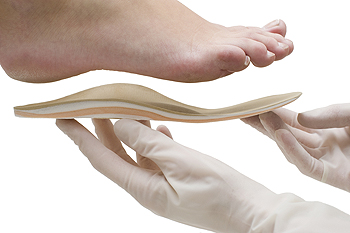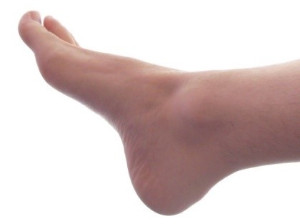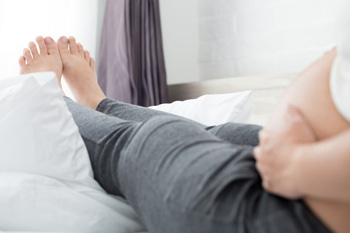Items filtered by date: September 2018
The Benefits of Using Orthotics
 Many people have chosen to use orthotics in their shoes for the primary reason of relieving pain and discomfort that may be associated with certain foot conditions. There may be many beneficial reasons for using orthotics including maintaining proper arch support, relieving uncomfortable pressure the feet may endure from daily activities, and to aid in diminishing heel pain. Research has shown that body weight may be easier to balance on the feet when the proper orthotics are used. A common reason to use orthotics may be overpronation, which is the term referred to when the foot rolls too far inward. If left untreated, it may cause a plethora of additional foot ailments, including bunions, calluses, and plantar fasciitis, which is an inflammation of the tissue that runs along the sole of the foot. If you would like additional information about orthotics, please consult with a podiatrist who can properly measure your foot for these devices.
Many people have chosen to use orthotics in their shoes for the primary reason of relieving pain and discomfort that may be associated with certain foot conditions. There may be many beneficial reasons for using orthotics including maintaining proper arch support, relieving uncomfortable pressure the feet may endure from daily activities, and to aid in diminishing heel pain. Research has shown that body weight may be easier to balance on the feet when the proper orthotics are used. A common reason to use orthotics may be overpronation, which is the term referred to when the foot rolls too far inward. If left untreated, it may cause a plethora of additional foot ailments, including bunions, calluses, and plantar fasciitis, which is an inflammation of the tissue that runs along the sole of the foot. If you would like additional information about orthotics, please consult with a podiatrist who can properly measure your foot for these devices.
If you are having discomfort in your feet and would like to try orthotics, contact one of our podiatrists from Pennsylvania. Our doctors can provide the care you need to keep you pain-free and on your feet.
What Are Orthotics?
Orthotics are inserts you can place into your shoes to help with a variety of foot problems such as flat feet or foot pain. Orthotics provide relief and comfort for minor foot and heel pain but can’t correct serious biomechanical problems in your feet.
Over-the-Counter Inserts
Orthotics come in a wide variety of over-the-counter inserts that are used to treat foot pain, heel pain, and minor problems. For example, arch supports can be inserted into your shoes to help correct overarched or flat feet, while gel insoles are often used because they provide comfort and relief from foot and heel pain by alleviating pressure.
Prescription Orthotics
If over-the-counter inserts don’t work for you or if you have a more severe foot concern, it is possible to have your podiatrist prescribe custom orthotics. These high-quality inserts are designed to treat problems such as abnormal motion, plantar fasciitis, and severe forms of heel pain. They can even be used to help patients suffering from diabetes by treating foot ulcers and painful calluses and are usually molded to your feet individually, which allows them to provide full support and comfort.
If you are experiencing minor to severe foot or heel pain, it’s recommended to speak with your podiatrist about the possibilities of using orthotics. A podiatrist can determine which type of orthotic is right for you and allow you to take the first steps towards being pain-free.
If you have any questions please contact one of our offices located in Plymouth Meeting and Ambler, PA . We offer the newest diagnostic and treatment technologies for all your foot and ankle needs.
What is Tarsal Tunnel Syndrome Caused By?
 If you experience discomfort and pain on the inside of your foot, you may have what is referred to as tarsal tunnel syndrome. This condition may also be called TTS, and may result from constant overuse of the ankle and foot. Activities that can cause this ailment to develop may include walking, exercising or running and can also occur from a serious injury. The surrounding area may become inflamed as a result of damaged nerves, which may have a negative impact in performing daily activities. Research has shown that early diagnosis and treatment of tarsal tunnel syndrome may accelerate the healing process, which may typically begin with resting the foot. Severe cases of this condition may be treated with orthotics or physical therapy. It’s suggested to speak with a podiatrist as quickly as possible to ensure that a proper diagnosis is performed and the correct treatment options are discussed.
If you experience discomfort and pain on the inside of your foot, you may have what is referred to as tarsal tunnel syndrome. This condition may also be called TTS, and may result from constant overuse of the ankle and foot. Activities that can cause this ailment to develop may include walking, exercising or running and can also occur from a serious injury. The surrounding area may become inflamed as a result of damaged nerves, which may have a negative impact in performing daily activities. Research has shown that early diagnosis and treatment of tarsal tunnel syndrome may accelerate the healing process, which may typically begin with resting the foot. Severe cases of this condition may be treated with orthotics or physical therapy. It’s suggested to speak with a podiatrist as quickly as possible to ensure that a proper diagnosis is performed and the correct treatment options are discussed.
Tarsal tunnel syndrome can be very uncomfortable to live with. If you are experiencing tarsal tunnel syndrome, contact one of our podiatrists of Pennsylvania. Our doctors can provide the care you need to keep you pain-free and on your feet.
Tarsal Tunnel Syndrome
Tarsal tunnel syndrome, which can also be called tibial nerve dysfunction, is an uncommon condition of misfiring peripheral nerves in the foot. The tibial nerve is the peripheral nerve in the leg responsible for sensation and movement of the foot and calf muscles. In tarsal tunnel syndrome, the tibial nerve is damaged, causing problems with movement and feeling in the foot of the affected leg.
Common Cause of Tarsal Tunnel Syndrome
- Involves pressure or an injury, direct pressure on the tibial nerve for an extended period of time, sometimes caused by other body structures close by or near the knee.
- Diseases that damage nerves, including diabetes, may cause tarsal tunnel syndrome.
- At times, tarsal tunnel syndrome can appear without an obvious cause in some cases.
The Effects of Tarsal Tunnel Syndrome
- Different sensations, an afflicted person may experience pain, tingling, burning or other unusual sensations in the foot of the affected leg.
- The foot muscles, toes and ankle become weaker, and curling your toes or flexing your foot can become difficult.
- If condition worsens, infections and ulcers may develop on the foot that is experiencing the syndrome.
A physical exam of the leg can help identify the presence of tarsal tunnel syndrome. Medical tests, such as a nerve biopsy, are also used to diagnose the condition. Patients may receive physical therapy and prescriptive medication. In extreme cases, some may require surgery.
If you have any questions please feel free to contact one of our offices located in Plymouth Meeting and Ambler, PA . We offer the newest diagnostic and treatment technologies for all your foot and ankle needs.
Foot Ailments that May Occur During Pregnancy
 Pregnant women often experience foot conditions that may be a result of the changes the feet endure, which may be due to the additional weight. Foot pain is a common symptom, and this may occur the majority of the time, as a result of the feet becoming flat. Additional common symptoms that may affect the feet can include extreme swelling, which may also be referred to as edema, ingrown toenails, and cracked heels. The latter often occurs as a result of the additional weight, which may cause the feet to lose elasticity. The skin may become dry, and cracks may form, which is often uncomfortable and painful. Research has shown there may be preventative measures that can be implemented, which may help the feet to feel better. These may include elevating the feet as frequently during the day as possible, incorporating a gentle exercise program, and drinking plenty of fresh water as often as possible. If you are experiencing specific foot conditions, it’s helpful to consult with a podiatrist who can properly treat any foot condition you may have.
Pregnant women often experience foot conditions that may be a result of the changes the feet endure, which may be due to the additional weight. Foot pain is a common symptom, and this may occur the majority of the time, as a result of the feet becoming flat. Additional common symptoms that may affect the feet can include extreme swelling, which may also be referred to as edema, ingrown toenails, and cracked heels. The latter often occurs as a result of the additional weight, which may cause the feet to lose elasticity. The skin may become dry, and cracks may form, which is often uncomfortable and painful. Research has shown there may be preventative measures that can be implemented, which may help the feet to feel better. These may include elevating the feet as frequently during the day as possible, incorporating a gentle exercise program, and drinking plenty of fresh water as often as possible. If you are experiencing specific foot conditions, it’s helpful to consult with a podiatrist who can properly treat any foot condition you may have.
Pregnant women with swollen feet can be treated with a variety of different methods that are readily available. For more information about other cures for swollen feet during pregnancy, consult with one of our podiatrists from Pennsylvania. Our doctors will attend to all of your foot and ankle needs.
What Foot Problems Can Arise During Pregnancy?
One problem that can occur is overpronation, which occurs when the arch of the foot flattens and tends to roll inward. This can cause pain and discomfort in your heels while you’re walking or even just standing up, trying to support your baby.
Another problem is edema, or swelling in the extremities. This often affects the feet during pregnancy but tends to occur in the later stages.
How Can I Keep My Feet Healthy During Pregnancy?
- Wearing orthotics can provide extra support for the feet and help distribute weight evenly
- Minimize the amount of time spent walking barefoot
- Wear shoes with good arch support
- Wear shoes that allow for good circulation to the feet
- Elevate feet if you experience swelling
- Massage your feet
- Get regular, light exercise, such as walking, to promote blood circulation to the feet
If you have any questions please feel free to contact one of our offices located in Plymouth Meeting and Ambler, PA . We offer the newest diagnostic and treatment technologies for all your foot and ankle needs.
What Are Heel Spurs?
 If you experience sharp pains in your heels when you wake up in the morning, there is a chance you could have a heel spur. Heel spurs are calcium deposits that cause a bony protrusion beneath the heel bone. This ailment is typically associated with another heel condition called plantar fasciitis. There are often no symptoms that accompany having a heel spur. Nevertheless, there are factors that may make some people more likely to suffer from heel spurs than others. Those who run often, have gait abnormalities, are obese, or wear poorly fitting shoes are more likely to develop a heel spur.
If you experience sharp pains in your heels when you wake up in the morning, there is a chance you could have a heel spur. Heel spurs are calcium deposits that cause a bony protrusion beneath the heel bone. This ailment is typically associated with another heel condition called plantar fasciitis. There are often no symptoms that accompany having a heel spur. Nevertheless, there are factors that may make some people more likely to suffer from heel spurs than others. Those who run often, have gait abnormalities, are obese, or wear poorly fitting shoes are more likely to develop a heel spur.
Heel spurs can be incredibly painful and sometimes may make you unable to participate in physical activities. To get medical care for your heel spurs, contact one of our podiatrists from Pennsylvania. Our doctors will do everything possible to treat your condition.
Heels Spurs
Heel spurs are formed by calcium deposits on the back of the foot where the heel is. This can also be caused by small fragments of bone breaking off one section of the foot, attaching onto the back of the foot. Heel spurs can also be bone growth on the back of the foot and may grow in the direction of the arch of the foot.
Older individuals usually suffer from heel spurs and pain sometimes intensifies with age. One of the main condition's spurs are related to is plantar fasciitis.
Pain
The pain associated with spurs is often because of weight placed on the feet. When someone is walking, their entire weight is concentrated on the feet. Bone spurs then have the tendency to affect other bones and tissues around the foot. As the pain continues, the feet will become tender and sensitive over time.
Treatments
There are many ways to treat heel spurs. If one is suffering from heel spurs in conjunction with pain, there are several methods for healing. Medication, surgery, and herbal care are some options.
If you have any questions feel free to contact one of our offices located in Plymouth Meeting and Ambler, PA . We offer the latest in diagnostic and treatment technology to meet your needs.
